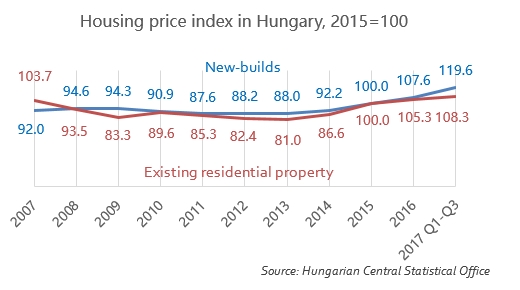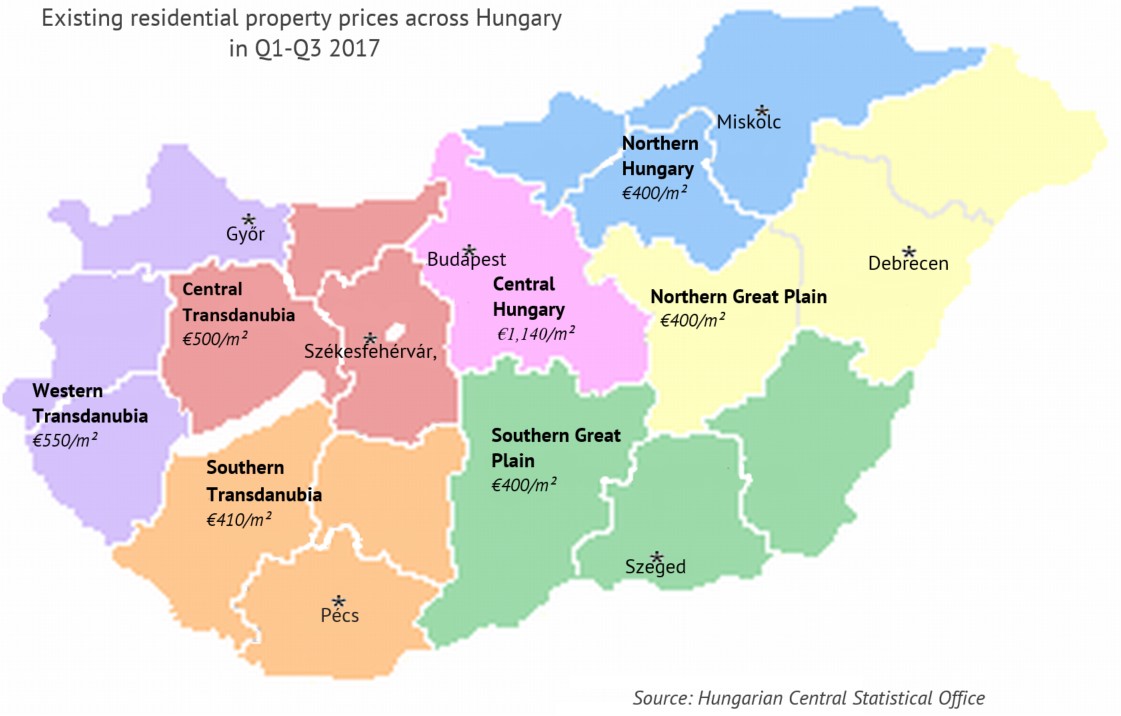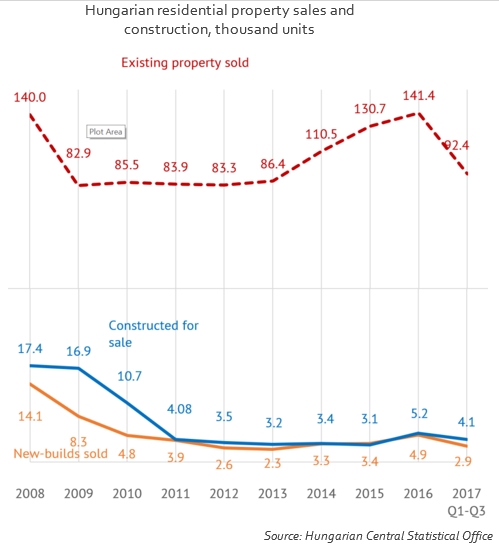Residential real estate in Hungary set to grow
Hungary is a popular location among small companies and international corporations who want a base in Central Europe. The country has a strong labour base, and salaries are low compared to most European Union (EU) countries. According to Statista, the average annual wage in Hungary is just €6,700, or about four times less than France or Germany. IBM, Morgan Stanley and EPAM are among the companies that have offices in Budapest. Additionally, property in Hungary is cheap. According to Statista, as of February 2018, prices average €2,500/m² compared to €4,300/m² in Germany, €11,600/m² in Austria and €12,800/m2 in France.
Investors believe
Growing prices, especially in central districts
The 2008 global economic crisis had a negative effect on Hungarian property prices. According to the Hungarian Central Statistical Office (Központi Statisztikai Hivatal), between 2007 and 2013, when prices bottomed out, prices of existing residential property fell by 22%, while prices

Property prices vary across Hungary. The country is divided into 19 counties forming seven regions, with Central Hungary being the most expensive, with an average price of €1,140/m². Local property prices grew the most during the first three quarters of 2017 — by 15% from 2016. In the rest of the regions, residential property is twice or thrice cheaper, despite prices increasing

According to the Hungarian Central Statistical Office, property prices in the administrative centres of Hungary are growing twice faster than in small localities. The price per square metre is growing 25% faster in new builds than in the existing property market.
Residential property prices
across various types of communities in Hungary, Q1–Q3 2017
| New-builds | Existing residential property |
|||
|---|---|---|---|---|
| Price, €/m² | Price increase since 2016, % |
Price, €/m² | Price increase since 2016, % |
|
| Budapest | 1,620 | 10.2 | 1,310 | 13.6 |
| Administrative centres | 1,000 | 15.1 | 650 | 11.5 |
| Other cities | 960 | 7.6 | 460 | 5.1 |
| Villages | 800 | 5.9 | 240 | 2.8 |
| Nationwide average |
1,160 | 11.1 | 660 | 8.4 |
Construction and sales volume recovery
The crisis affected the construction sector more severely. According to the Hungarian Central Statistical Office, in 2008, about 17,400 residential facilities were built, compared to 3,100 in 2015. Construction volumes began recovering as late as in 2016. According to the latest data, during the first three quarters of 2017, 4,100 newly built residential facilities were listed for sale.

The volume of sales for existing property in Hungary is dozens of times more than for new-builds. During the first three quarters of 2017 92,400 residential facilities were sold in the existing property market, compared to 2,900
Incentives for market development
Temporary VAT cut
Since January 1, 2016, a reduced VAT rate of 5% instead of 27% has been applied
Cheap mortgages
According to Laszlo Balogh, the leading expert from Hungarian property website ingatlan.com, property prices are growing faster than locals can afford, which is causing the demand for loans and cheap property to grow. According to the Hungarian Central Statistical Office, the total amount of residential loans issued in H1 2017 was €930 million,
Family Housing Support Programme (CSOK)
Since 2015, Hungary has been running the CSOK housing support programme for families with children. Families with three or more children planning to buy newly built residential properties receive the most benefits under this programme – they get a €32,000 grant and a loan of the same amount on concessional terms. In H1 2017, 12,800 families received grants, which exceeded the 2016 figure
Rising construction costs
The Hungarian government is raising energy performance requirements for buildings, making construction more expensive for developers. According to Hungarian web portal Portfolio, in 2017, the amount developers spent on construction was 1.5 times higher than in 2015, and by 2020 costs will rise by another 40%. In contrast, construction expenses rose by 5.2% in comparison to 2016, according to the Hungarian Central Statistical Office.
Rental property investments
Hungarian apartments may be an attractive investment for those who plan to rent them out. Although the number of Hungarians renting residential property is small, it is growing gradually (from 3.6% to 5.2% between 2011 and 2017) as inhabitants of small localities move to cities in search of employment. In particular, the growing number of international students in the country is raising the demand for rental property. According to Daily News Hungary, this number was 28,000 in 2017 and is expected to increase to 40,000 by 2023. At the same time,
It is relatively easy for a foreign national to buy Hungarian property. The payment is done in stages. First, the buyer puts down a deposit of about 1% of the property price, proving the seriousness of his/her intention. The buyer pays another
10–15% during the execution of the sales agreement. The local municipal authority must approve the purchase, which takes 6 to 8 weeks. After that the remaining amount must be paid. Buying expenses constitute5-6%, which includes the legal service charge(1–1.5%) and the purchase tax. After this is paid, the transaction is registered with the Land Registry. In Hungary, sellers paythe realtor's fee.
Olga Anisimova, real estate writer and content strategist at Tranio.com
We will send you a content digest not more than once a week
